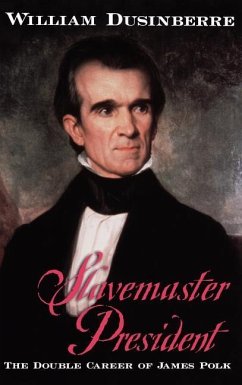Yet Polk was in some respects an enlightened owner, instituting an unusual incentive plan for his slaves and granting extensive privileges to his most favored slave. Startlingly, Dusinberre shows how Polk sought to hide from public knowledge the fact that, while he was president, he was secretly buying as many slaves as his plantation revenues permitted. Shortly before his sudden death from cholera, the president quietly drafted a new will, in which he expressed the hope that his slaves might be freed-but only after he and his wife were both dead. The very next day, he authorized the purchase, in strictest secrecy, of six more very young slaves. By contrast with Senator John C. Calhoun, President Polk has been seen as a moderate Southern Democratic leader. But Dusinberre suggests that the president's political stance toward slavery- influenced as it was by his deep personal involvement in the plantation system- may actually have helped precipitate the Civil War that Polk sought to avoid.
James K. Polk held the office of President from 1845 to 1849, a period when the expansion of slavery into the territories emerged as a pressing question in American politics. During his presidency, the slave period of Texas was annexed and the future of slavery in the Mexican Cession was debated. Polk also owned a substantial cotton plantation in northern Mississippi and fifty-four slaves. He was an absentee master who had a string of overseers or agents manage his plantation and did not visit his estate while he was in the White House. In this book, William Dusinberre reconstructs the world of Polk's estate and the lives of his slaves, and analyzes how Polk's experience as a slavemaster conditioned his stance towards slavery-related issues. Dusinberre argues that Polk's policies helped precipitate the civil war he had sought to avert.
Hinweis: Dieser Artikel kann nur an eine deutsche Lieferadresse ausgeliefert werden.
James K. Polk held the office of President from 1845 to 1849, a period when the expansion of slavery into the territories emerged as a pressing question in American politics. During his presidency, the slave period of Texas was annexed and the future of slavery in the Mexican Cession was debated. Polk also owned a substantial cotton plantation in northern Mississippi and fifty-four slaves. He was an absentee master who had a string of overseers or agents manage his plantation and did not visit his estate while he was in the White House. In this book, William Dusinberre reconstructs the world of Polk's estate and the lives of his slaves, and analyzes how Polk's experience as a slavemaster conditioned his stance towards slavery-related issues. Dusinberre argues that Polk's policies helped precipitate the civil war he had sought to avert.
Hinweis: Dieser Artikel kann nur an eine deutsche Lieferadresse ausgeliefert werden.








